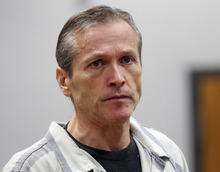This is an archived article that was published on sltrib.com in 2013, and information in the article may be outdated. It is provided only for personal research purposes and may not be reprinted.
A judge refused Monday to derail the prosecution of Pleasant Grove doctor Martin MacNeill, accused of killing his wife in 2007 so he could continue an extra-marital affair.
MacNeill's attorneys, Randy Spencer and Susanne Gustin, have filed two motions asking 4th District Judge Samuel McVey to disqualify the Utah County Attorney's Office from handling the case. But McVey said so far there is insufficient evidence that prosecutors did anything wrong.
On Monday, McVey heard arguments related to a motion filed in February alleging the attorney's office lied to a judge in July 2012 in order to secure a warrant for a wiretap. The other motion alleges that prosecutors withheld thousands of pages of evidence from defense attorneys.
MacNeill's wife, Michele MacNeill, was found dead in her bathtub on April 11, 2007, but charges were not filed against the husband until August 2012. According to court documents, MacNeill was having an affair at the time of his wife's death and devised a plan to kill her in order to continue the affair. MacNeill has pleaded not guilty to charges of murder and obstruction of justice.
According to the February motion, the Utah County Attorney's Office asked Judge Fred Howard to authorize use of a wiretap to gather evidence that MacNeill and his alleged mistress, Gypsy Willis, were involved in homicide, witness tampering, conspiracy and obstruction of justice. Interceptions of MacNeill's and Willis' communications began on July 17, but were suspended nine days later because of a lack of relevant information.
In an affidavit asking for the search warrant, investigator Jeff Robinson said "normal avenues of investigation" failed to provide sufficient evidence to prosecute the case to a standard beyond reasonable doubt.
Spencer argued Monday that the Utah County Attorney's Office was "misleading at best, misrepresent[ing] at worst" when it asked Howard for permission to wiretap MacNeill, since MacNeill subsequently was charged with murder and obstructing justice despite the ineffective wiretap.
"They misrepresented the Utah County Attorney Office's intentions," Spencer argued. "[The investigator] told Judge Howard if he didn't give them the wiretap, they would not be able to proceed with prosecution."
Spencer also argued that the attorney's office has a conflict of interest since it is operating as both the investigating and prosecuting agency, while most criminal cases are investigated by a law enforcement agency.
But Deputy Utah County Attorney Sam Pead argued that Robinson, the investigator in the case, has a differing role than prosecuting attorneys.
"It's his duty to investigate," Pead said of Robinson. "It's our duty to prosecute the case, whether he is in our bureau or whether he's in the sheriff's office."
McVey said Monday that the "limiting language" in the affidavit asking for the wiretap did not lead him to believe the attorney's office did anything illegal or improper.
"They are not trying to do a fishing expedition here," McVey said. "They are trying to find the full nature and manner" in which Martin MacNeill may have been involved in his wife's death.
McVey said that investigators probably believed the wiretap would implicate Willis in the alleged murder, noting that Willis was never charged in connection with Michele MacNeill's death and that Martin MacNeill was not charged with conspiracy or witness tampering.
After an autopsy in 2007, Michele MacNeill's manner of death was ruled "natural," the result of chronic hypertension and myocarditis. However, after a review in 2010, the manner of death was changed to "undetermined," and attributed to heart disease and drug toxicity.
Prosecutors are attempting to quash the second motion, which will be argued on May 16. Details regarding the motion to quash are not public because those documents have been sealed.
Twitter: @jm_miller





